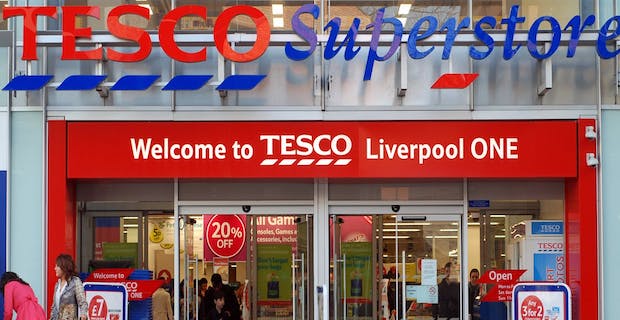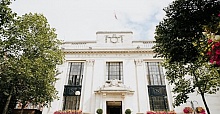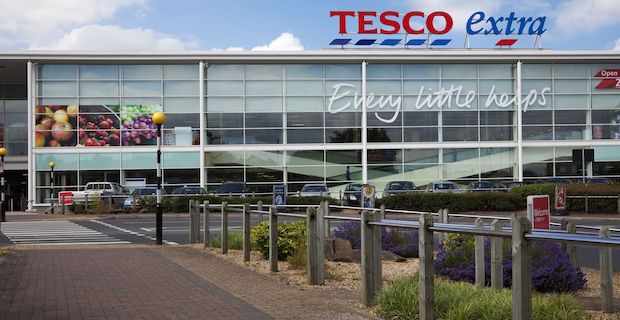The supermarket giant said it wasn't able to meet demand as more shoppers stay at home, despite the fact it has increased its online grocery shopping capacity by more than 20%. It said in the first weeks of the virus, there was "significant panic buying", with sales up almost a third. Tesco said that had now subsided with food stocks "returning to normal". "Between 85% and 90% of all food bought will require a visit to a store and here significant changes to the store environment have been implemented to maximise safety for colleagues and customers," chief executive Dave Lewis said.
Mr Lewis said that during its peak week of stockpiling, Tesco sold:
- 3.1 million containers of liquid soap, an increase of 363%
- 6 million tins of beans, more than double the usual amount
- 3.3 million tins of tomatoes, up 115% compared to a typical week
- 3.6 million packets of toilet roll, an increase of 76%
In contrast, he said sales of clothing and fuel both fell by 70%. The chain said it would continue trying to "prioritise home delivery for the most vulnerable in society". Mr Lewis said that Tesco normally operates 660,000 home delivery slots but it is now running around 805,000. He said that last Friday night, the government gave Tesco a list of 110,000 names of people it classed as vulnerable. The supermarket has contacted these people and offered them slots.

The statement came as the chain reported a sharp fall in pre-tax profit for the year to the end of February, down almost 19% to £1.3bn, largely due to restructuring costs in Europe. The chain also said it was impossible to forecast sales for 2020 due to the coronavirus pandemic. Tesco said the virus could add almost £1bn in extra costs due to extra staff and store expenses. It said it had already experienced a "significant absence" of staff amid the virus and had recruited more than 45,000 new staff over the past two weeks to cope with the heightened demand. Mr Lewis said some 50,000 colleagues have been absent out of about 320,000 employees. The supermarket has also agreed to pay a dividend of 6.5p to shareholders, based on its last financial year.
This has attracted some criticism as the grocer has benefitted from a business rates holiday to the tune of £585m while seeing record sales during the coronavirus crisis. Tesco also intends to pay a dividend on the current financial year, though at a lower level. The supermarket giant reported group sales up 1.3% to £64.8bn. Like-for-like sales, which strips out revenue from new shops opened during the year to February, fell 0.6%. Same store sales in the UK fell by 0.6%.
Source: BBC NEWS


 Prime Minister Keir Starmer's 2025 Easter message
Prime Minister Keir Starmer's 2025 Easter message After Nesil Caliskan a by-election will be held in Jubilee ward in Enfield
After Nesil Caliskan a by-election will be held in Jubilee ward in Enfield Publishing the analysis, Labour’s Cllr Ergin Erbil said Everybody in Enfield deserves basic rights
Publishing the analysis, Labour’s Cllr Ergin Erbil said Everybody in Enfield deserves basic rights Gaza-Israel conflict Statement from Cllr Ergin Erbil, Leader of Enfield Council
Gaza-Israel conflict Statement from Cllr Ergin Erbil, Leader of Enfield Council The European Union called on Turkey to uphold democratic values
The European Union called on Turkey to uphold democratic values Turkish citizens in London said Rights, Law, Justice
Turkish citizens in London said Rights, Law, Justice The Council of Turkish Cypriot Associations Geneva response letter
The Council of Turkish Cypriot Associations Geneva response letter Sustainable Development and ESG, Will This Become the Course for Turkic World
Sustainable Development and ESG, Will This Become the Course for Turkic World The 'Prince of Paris' has impressed in his first EuroLeague season
The 'Prince of Paris' has impressed in his first EuroLeague season Saran Media And Euroleague Basketball Extend Media Rights Partnership for Four More Years
Saran Media And Euroleague Basketball Extend Media Rights Partnership for Four More Years Will Rangers be Jose Mourinho’s next victim?
Will Rangers be Jose Mourinho’s next victim? Jose Mourinho's Fenerbahce face Rangers on Thursday
Jose Mourinho's Fenerbahce face Rangers on Thursday Barclays has become the biggest UK lender so far to cut mortgage rates
Barclays has become the biggest UK lender so far to cut mortgage rates THE SPRING STATEMENT EXPLAINED, UK ECONOMIC OUTLOOK AND GROWTH FORECASTS
THE SPRING STATEMENT EXPLAINED, UK ECONOMIC OUTLOOK AND GROWTH FORECASTS Launch of Made in Enfield gift shop to celebrate local artists and designers
Launch of Made in Enfield gift shop to celebrate local artists and designers Trial used smart Wi-Fi sensors for live building occupancy data to optimise
Trial used smart Wi-Fi sensors for live building occupancy data to optimise
















